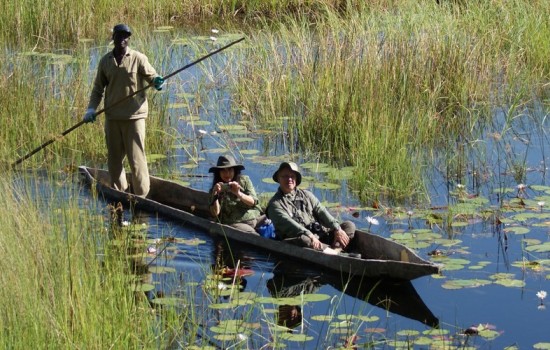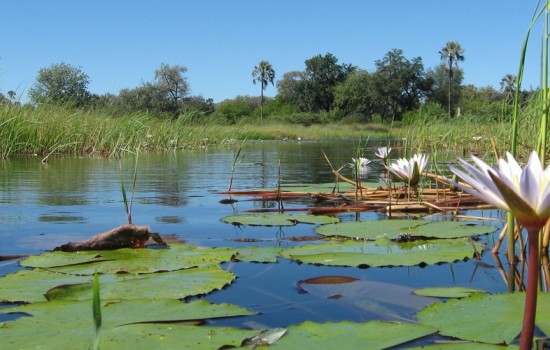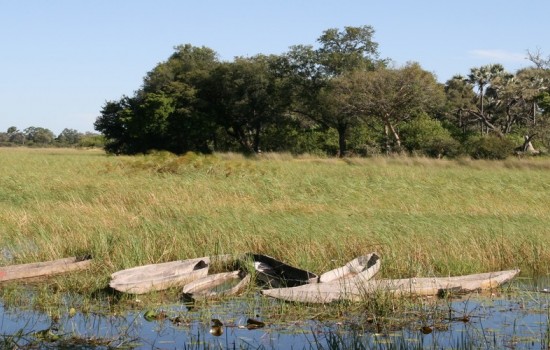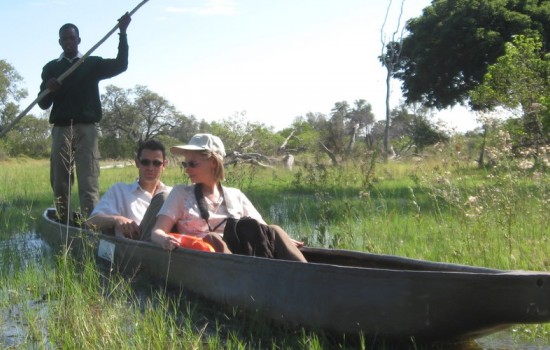Mokoro Safaris & Trails


The traditional dug-out canoe, or “Mokoro” (plural, “Mekoro”) was originally introduced into the Okavango Delta by the Bayei tribe who moved into the region from the Zambezi river area after the 1750’s. The presence of the tsetse fly meant that pastoralism was not possible and instead they relied on hunting and fishing for subsistence.
Trees that were favoured by the Bayei people for the construction of Mekoro were, the Kiaat (Pterocarpus Angolensis) or “mukwa” in Setswana, the Jackal Berry tree (Diospyros Mespiliformis) or “Mokutshumo” and the sausage tree (Kigelia Africana) or “Moporota.”
A tree might take well over a century to attain Mokoro size, but the lifespan of the Mokoro would typically only be about 5 – 8 years. In the interests of conservation and the protection of the trees and ecology of the Delta it is a recent policy of most camps and lodges in the area to use fibre-glass canoes that are modelled on the traditional wooden Mekoro.
The pole or “ngashi” that is used to push the Mokoro along is commonly made from the Silver Terminalia tree (Terminalia Sericea) or “Mogonono”. The straight growth form of the young branches, coupled to the elasticity of the wood, make it ideally suited to the task.
The Mokoro Trail should not really be considered as a game viewing safari, even though a variety of game is invariably seen, but more of a cultural snapshot of the traditional mode of transport used over the past few hundred years in the Okavango Delta and the opportunity to experience, through your guide poler, traditional knowledge and skills.
This day safari commences and ends in Maun. Depart at around 07h30 (or arrange departure time with safari office) for a one to one and a half hours transfer by 4 x 4 safari vehicle to the Mokoro station near the Ditshipi of the south-east in an exclusive wilderness area where you will meet your Professional Guide and polers. You will then travel by Mokoro, gliding effortlessly across the lagoons and through the papyrus and reed-fringed channels which are part of the Okavango Delta system.
Your guide will help to select a bush picnic site on the banks of one of the Okavango Delta channels where you will enjoy your lunch followed by a walking trail.


Wildlife
The Okavango is home to a prosperity of wildlife and attracts thousands of visitors a year. There are many different ways to visit this beautiful region and accommodation ranges from simple camps up to luxury resorts within the delta region.
The delta provides a seasonal habitat to numerous different species. Among these are African Bush Elephants, the African Buffalo, the Hippopotamus, the Lechwe, the Topi, the Blue Wildebeest, the Giraffe, the Nile crocodile, the Lion, the Cheetah, the Leopard, Brown and Spotted Hyenas, Kudu, the Sable Antelope, both the Black and the White Rhinoceros, the Plains Zebras, the Warthog and the Chacma Baboon. Notably the endangered African Wild Dog is present within the Okavango Delta, exhibiting one of the richest pack densities in Africa. The delta also includes over 400 species of birds, including the African Fish Eagle, the Crested Crane, the Lilac-breasted Roller, the Hammerkop, Ostrich, and the Sacred Ibis.


